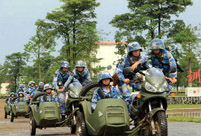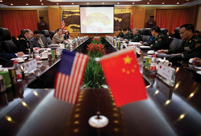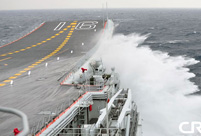 'Jin' named the word of the year by cross-strait netizens
'Jin' named the word of the year by cross-strait netizens Chinese scientific expedition goes to build new Antarctica station
Chinese scientific expedition goes to build new Antarctica station
 Chinese naval escort fleet conducts replenishment in Indian Ocean
Chinese naval escort fleet conducts replenishment in Indian Ocean 17th joint patrol of Mekong River to start
17th joint patrol of Mekong River to start China's moon rover, lander photograph each other
China's moon rover, lander photograph each other Teaming up against polluters
Teaming up against polluters
Year of power wrestling: strategic differences to make up
Although China and the US have signaled willingness to "lengthen the shortest stave", they still face extremely challenging strategic differences, among them the unavoidable issue of the Air Defense Identification Zone over the East China Sea.
"It shows that huge trust deficits still exist in certain areas in the bilateral relationship," said Robert Daly, Director of the Kissinger Institute on China and the US at the Wilson Center. "The US would like to consolidate its presence and the interests of its allies in the Asia Pacific region and would not like to see the status quo changed. China, on the other hand, wants to increase its defense capabilities as its national power grows, which is also reasonable."
"It would be wrong to think that the US China relationship will turn sour as a result of the establishment of the Air Defense Identification Zone," Roy said. However, he stressed that the tension in the East China Sea and the antagonism between China and Japan do bring risks to the Sino-US relationship. "The US needs to realize that the more the strain in the China-Japan relationship intensifies, the more awkward America's position becomes. Therefore, the US must act with caution in terms of the issue."
As to how the two countries can resolve their strategic differences, Daly identified two premises: First, the US acknowledges that the rise of China is reasonable and inevitable; Second, China accepts that the US has reasonable concerns over its rise. Addressing the problem needs the two sides to better explain their strategic intentions to one another and to match their words with deeds.
"The US and China need to set up new rules, offering China more space and opportunities," Daly said. "If China can put forward new constructive rules, the US needs to give up some of its old rules as well as its problematic attitude."
Year of uncertainty: undercurrents in the West Pacific
Speaking of the biggest challenge for the China-US relationship, many experts interviewed believed it lies in the West Pacific. Specifically, the Korean Peninsula, the East China Sea and the South China Sea are all areas of tension; the interests of China, the US, and other powers in the region are too complicated and intertwined to be easily resolved; and Obama's rebalancing strategy in Asia Pacific has deepened China's concerns about US intentions: these issues added together bespeak a year of fast-flowing undercurrents in 2014.
"If sensitive matters are not dealt with properly, neighboring countries in the region will suffer too." Roy believes the key point in the game is to keep regional problems from dominating broader policies and from hampering cooperation in more important areas.
According to Richard C. Bush III, Director of Brookings Institutions' Center for East Asia Policy Studies, "China and the US need to start establishing a new set of rules which oversees interactions in international airspace and waters and lowers the probability of incidents." "Although the navy encounter scenario is over, the US and China should avoid "coming too close" again, adding destabilizing factors to the West Pacific region," he adds.
Bonnie Glaser, senior adviser for Asia at the US Center for Strategic and International Studies agrees with Bush. "China and the US already have a mechanism for negotiations over naval security matters. Similar mechanisms can be built with regard to international airspace and waters to prevent small probability events from happening," Glaser told reporters.

 Commemorate 120th birth anniversary of Mao Zedong
Commemorate 120th birth anniversary of Mao Zedong Female soldiers of PLA Marine Corps in training
Female soldiers of PLA Marine Corps in training Chinese cities to have a very grey Christmas as smog persists
Chinese cities to have a very grey Christmas as smog persists China and U.S. - the national image in each other’s eyes
China and U.S. - the national image in each other’s eyes The Liaoning's combat capability tested in sea trial
The Liaoning's combat capability tested in sea trial Chinese pole dancing team show their moves in snow
Chinese pole dancing team show their moves in snow Rime scenery in Mount Huangshan
Rime scenery in Mount Huangshan Ronnie O'Sullivan: My children mean the world to me
Ronnie O'Sullivan: My children mean the world to me Shopping in Hong Kong: a different picture
Shopping in Hong Kong: a different picture The buzzwords in 2013
The buzzwords in 2013 Top 10 domestic news of 2013
Top 10 domestic news of 2013 Red crabs begin annual migrations in Australia
Red crabs begin annual migrations in Australia Artifacts retrieved from West Zhou Dynasty
Artifacts retrieved from West Zhou Dynasty Aftermath of Volgograd railway station blast
Aftermath of Volgograd railway station blast Fleet hits targets in training
Fleet hits targets in trainingDay|Week|Month